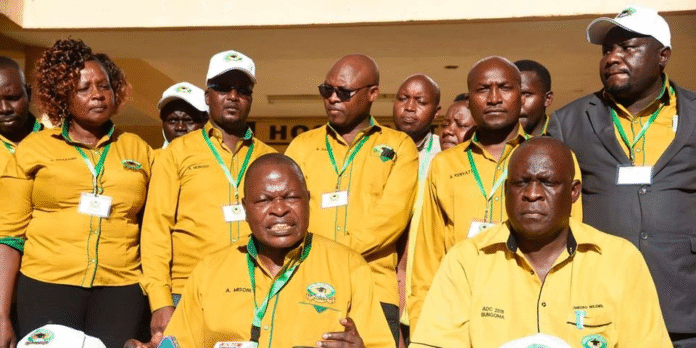
Public secondary schools across Kenya are facing imminent shutdown after teachers issued a one-week ultimatum to the government to release delayed capitation funds or risk a nationwide education crisis.
Speaking at the Kenya Union of Post Primary Education Teachers (KUPPET) National Governing Council meeting on July 11, 2025, Secretary General Akelo Misori warned that schools are struggling to operate due to the government’s failure to disburse adequate funds. He noted that most principals are unable to meet essential costs as parents continue to default on fees amid tough economic conditions.
“Principals are struggling to keep learners in school. They have waited for the government to release capitation funds, but it is taking too long. With the current economic hardships, most parents have not paid school fees. If nothing is done soon, it will be impossible to keep these schools running. The only viable option left may be to send students home,” Misori cautioned.
According to Misori, only Ksh4,000 has been disbursed per learner since January—far short of the Ksh22,244 required. He said the shortfall has crippled crucial services, including feeding programmes, electricity, water supply, learning materials, and co-curricular activities.
“From January to now, only Ksh4,000 has been released per student. That is drastically below the required amount. Schools need to pay for food, water, electricity, teaching materials, and co-curricular activities. Without proper funding, all these essential services are at risk,” he said.
He further lamented that headteachers are being forced to manage schools without sufficient support while dealing with growing pressure from parents unable to meet fee obligations. Misori accused the government of worsening the crisis through its continued silence and warned that teachers are ready to act if the situation does not improve.
KUPPET also raised concerns over stalled Collective Bargaining Agreement (CBA) negotiations with the Teachers Service Commission (TSC), warning that the current deal expires on June 30, 2025. Misori said although the union submitted its proposals, TSC has not issued any response, prompting the union to seek intervention from Labour Cabinet Secretary Alfred Mutua.
“Our proposal is already with the TSC, but they have not responded. We are not ready to accept anything that does not improve the welfare of our members,” Misori said.
The union is demanding a 50 per cent salary increase for teachers in higher job groups and a 100 per cent raise for those in lower grades. Other demands include harmonised house allowances, a 20 per cent general salary increment, and substantial increases in commuter, hardship, and co-curricular duty allowances.
“In our proposed CBA, we are also asking for a 200 per cent increase in commuter allowance for higher grades and a 250 per cent increase for lower cadres. These teachers are incurring significant transport costs, especially those working in rural and remote areas,” Misori added.
KUPPET also wants a 100 per cent increase in hardship allowances and the introduction of a hazardous duty allowance equivalent to 20 per cent of a teacher’s basic salary, citing the risks faced by teachers in insecure regions.
The union further called for subsistence allowances for teachers involved in sports, music, and academic events, as well as policy changes to leave allowances—proposing that teachers receive one month’s basic salary instead of a flat rate. Additional proposals include overtime and risk allowances for teachers in bandit-prone areas in northern and eastern Kenya.
KUPPET National Chairperson Omboko Milemba echoed Misori’s sentiments, urging the TSC, the Ministry of Labour, and the Parliamentary Education Committee to take swift action to prevent a total breakdown in the education sector.
“We must treat teachers with the dignity they deserve. They are the backbone of our education system. Ignoring their plight will only deepen the crisis in our schools,” said Milemba.
He also criticized plans to scrap the national examination fee subsidy, warning it would violate children’s constitutional right to education and exclude students from poor families.
“Examination fees are a critical component of basic education. Removing them undermines Article 53 of the Constitution, which guarantees every child the right to free and compulsory education. If we start charging exam fees again, we will be locking out thousands of poor children from progressing in their education,” he warned.
With pressure mounting from educators and school heads, KUPPET has made it clear: unless the government acts urgently, schools across the country will close, sending millions of learners home.






